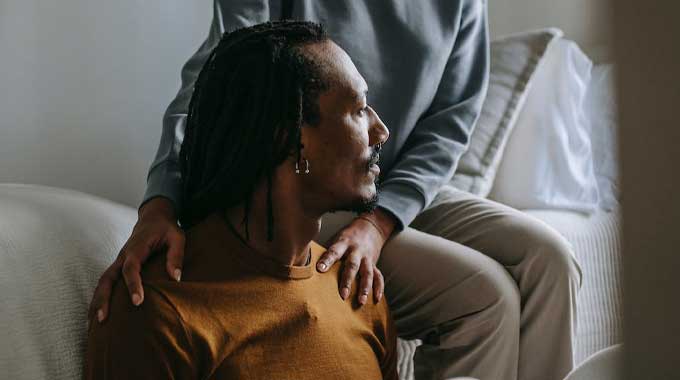Monnaye, my Case Manager at Cornerstone of Southern California welcomed me into her office with a smile and a handshake that made me feel instantly comfortable and safe. A few minutes later we were giggling about something or other when a few thoughts occurred to me, “I am going home soon. How is that going to feel? How will my family deal with me if I start to fall off the path that I am so firmly on while here at Cornerstone?”
Monnaye, as usual had all the answers for me and I thought that these answers might be very useful to others out there in the same situation. Monnaye really knows her stuff and I think her responses to my questions will help you too.
Q: What do I expect when he/she returns home from Cornerstone? What can I do to be ready and helpful?
Monnaye: This is a big deal! Two things come to mind: “What to do when they come home” (or while they’re in treatment) and, “What not to do when he/she returns home.”
What To Do
- The first thing the family members should do is to educate themselves on all aspects of addiction so they are aware of what may or may not happen. I recommend family members to read the book ‘Staying Sober’ by Terence T. Gorski. This book does an excellent job explaining what drug addiction is.
- I also would recommend going to a few Al-Anon meetings— give them a try. The addict’s family need to understand what their part is in this recovery process, and they MUST understand they cannot fix or change their loved one. All they can do is learn and change themselves.
- Families need to understand that they have to be patient and understanding with their newly recovered loved one. Addiction recovery is a process—not an event; so don’t expect a miracle of instant change.
What Not To Do
- Try not to take things personally. Let your loved one go to as many meetings as they feel they need, don’t give them a hard time about this as it is a very positive sign.
- You must communicate, even if what you have to say is negative.
- Don’t worry about being the cause of your loved one’s relapse, they can do that all on their own. You don’t have that much power over anyone. Be honest about your feelings. It’s “OK” not to know what to say; just don’t hold something in; it isn’t worth it.
- Don’t keep secrets from them; shine a light on everything. Saying that you don’t understand or that you don’t know what to do is always better than saying nothing at all.
Q: Would you ever tell the family members to play a direct role in the rehab process of their loved one?
Monnaye: The best thing a family can do is to take care of themselves and their actions. When they realize that they are powerless over their loved one’s addiction, they’ve taken the first step towards helping. Many families do all they can to help, but they often end up enabling their loved one in the process.
It’s very important that families allow their loved one to hit “rock bottom”. Continually helping and enabling an addict lets them start to think, “I don’t have a problem. They keep coming in and saving me, so I don’t have to truly deal with these issues.”
Q: So enabling someone is like a teacher whispering answers to her student during a test?
Monnaye: Exactly right! It’s all about letting go. It sounds simple; but it’s never easy.
Q: When an addict comes home from treatment, what do you recommend they do?
Monnaye: It varies from client to client, but having a routine and keeping busy is key.
When clients are here at Cornerstone, they’re on a tight schedule, and that’s intentional from a treatment perspective. Up until this point, they haven’t been able to do that for themselves in their own lives. Maintaining some form of daily routine when they return home is equally important.
Q: Is there a specific structure or routine you recommend to clients when they leave Cornerstone?
Monnaye: We work with them intensively, one-on-one before they leave the treatment setting and develop an exit plan that we both agree upon.
Within this exit plan we identify “high risk” situations and prepare them to deal with the risks they’ll confront back home. For example, if someone knows they’ve always had a drink after work, that desire won’t necessarily go away after treatment, so we help them form a plan to deal with these “risks.”
Q: Is a majority of this plan helping them to identify the triggers of their addiction, not only here at Cornerstone, but when they return home too. Is teaching them how to deal with those triggers when they return home a big part of your job as a counselor?
Monnaye: Yes it is! At Cornerstone our Relapse Prevention Education teaches our clients all about triggers and high risk situations.Once they’ve identified their personal triggers, we sit down with them and decide what we’re going to do as each trigger rears it’s ugly head.
Q: I have always thought that families were the people who push addicts out the door and into rehab. Is that an accurate statement?
Monnaye: Sometimes families do send their loved one to treatment in an appropriate way, but often they push them when they’re not ready and the addict is resentful early in recovery.
Most of what we tell families is to give the addict room to recover. Certainly talk about the problem, but don’t try to micro manage it.
Families are not all knowing or infallible. They can’t tell their loved one what to do.
Often the family doesn’t realize that they themselves exhibit a behavior called codependency. For the most part, the addicts know they’ve messed their lives up, but the families don’t realize their
enabling behaviors have helped keep their loved one’s disease alive and thriving. This isn’t a cut and dry issue, as all families are different.





